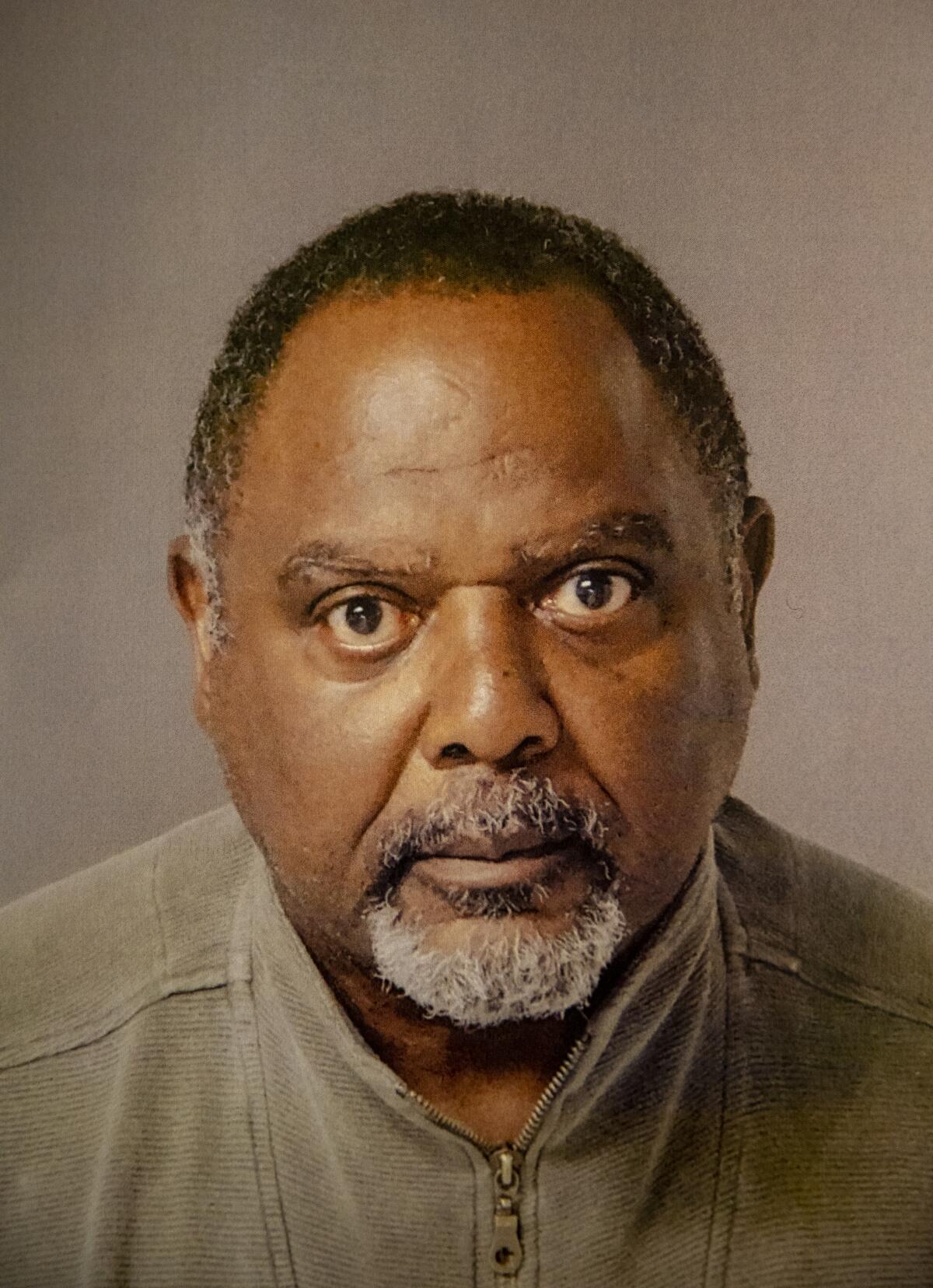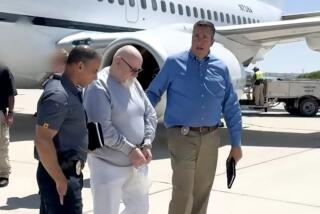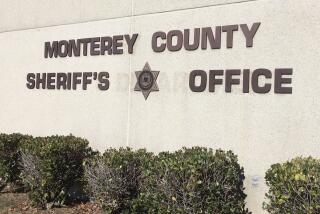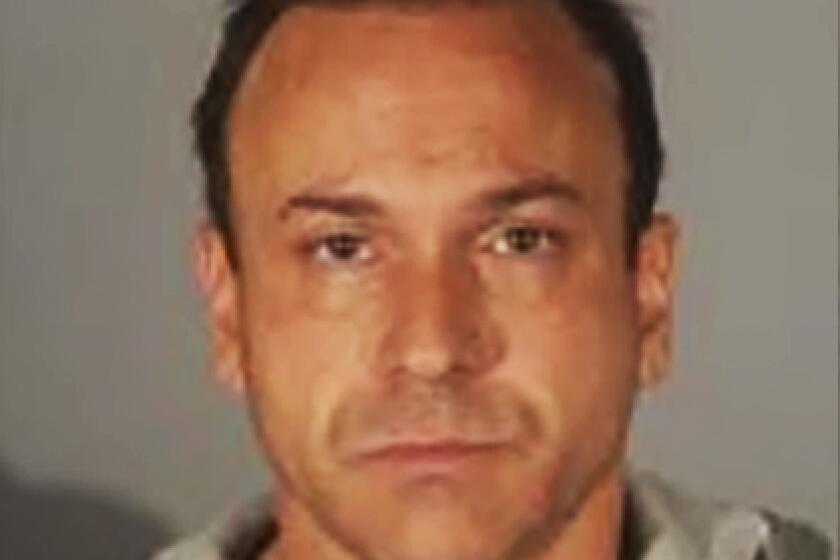L.A. prosecutors use genealogy search to make arrest in 1980s killings of two women

Los Angeles County prosecutors have filed two counts of murder against a man linked to a pair of decades-old cold cases by connecting the suspect through a genealogy match, a first for the office, Dist. Atty. Jackie Lacey said Friday.
Horace Van Vaultz Jr., 64, was charged with the 1986 killing of Mary Duggan in Burbank and the 1981 slaying of Selena Keough in Montclair. He will appear in a downtown Los Angeles courtroom Monday.
The victims were both strangled and sexually assaulted, according to investigators, who have been in touch with other law enforcement agencies about Vault’s possible links to other cold cases.
“Thanks to advances in technology and forensics, we are now able to virtually reach back in time and find those responsible for these vicious crimes,” Lacey said.
Vaultz was arrested Thursday after a traffic stop in Los Angeles, said Burbank Det. Aaron Kay, the lead investigator on Duggan’s killing. Vaultz does not currently have an attorney, prosecutors said.
Lacey declined to detail the specific method used to capture Vaultz, citing the ongoing investigation. But she likened the process to the one that cracked open the Golden State Killer case last year.
“We are talking about the commercial DNA databases that have been built over the years ... law enforcement accesses those databases by uploading DNA material from the crime and finding a relative’s match,” she said, speaking about the process in general. “From that, that can point to a suspect. Once you have a pool of suspects ... you’re then able to find that person and get the DNA.”
The use of genealogy websites and familial DNA searches to identify predators who would have otherwise skirted law enforcement has become increasingly common in recent years.
In addition to the Golden State Killer case, Los Angeles investigators finally arrested the so-called Grim Sleeper after matching DNA from the initial crime scenes to a relative of convicted killer Lonnie Franklin Jr. The relative’s DNA had been collected after he was convicted of a felony.

A genealogy match also led Washington, D.C., police to capture a man described as the “Potomac River Rapist,” who was accused of multiple assaults around the Beltway in the 1990s.
Lacey said prosecutors ran DNA collected from the initial crime scenes in Burbank and Montclair against a “commercial DNA database” to narrow the pool of possible suspects. Kay said investigators became aware of Vaultz’s possible involvement sometime in September, and Lacey said the 64-year-old’s DNA was matched to the killings through an item plucked from his trash last month.
Vaultz has traveled “all over Southern California” since the 1980s, according to Kay, who said the defendant’s permanent residence is in Bakersfield but that he “has a connection to Texas.”
Prosecutors have contacted other policing agencies to “determine if the defendant is responsible for other unsolved murders in California,” the district attorney’s office said in a statement.
“There’s definitely patterns that we’re trying to look at,” Kay said.
Court records show Vaultz had been accused of domestic violence crimes several times in the past few decades. In 1996, he was granted probation in a plea deal with the Los Angeles County district attorney’s office after he was charged with domestic abuse and assault.
A decade later, he was charged with domestic violence crimes again in Kern County, but prosecutors later dropped all charges. In 2007, Vaultz was again charged with beating a spouse or cohabitant, but was allowed to plead to a lesser charge of disturbing the peace, records show.
One woman sued Vaultz, alleging domestic violence in 2005 and 2007, the same years he was criminally charged with abuse in Kern County, records show.
Her parents, who asked that their names not be used out of fear of retaliation from Vaultz, said he victimized their daughter during a roughly yearlong relationship. She was hospitalized with injuries he allegedly caused on at least one occasion, they said.
“We were so afraid for her during that time,” her mother said. “She was absolutely petrified.”
The woman was “vulnerable” around the time she met Vaultz in the early 2000s, according to the mother, who said she had just finalized a divorce. Her parents did not like Vaultz from their first encounter, and became more concerned about him as he engaged in odd behavior after they moved in together. In one instance, her mother said, Vaultz came to the family home to aid in some repair work, but spent most of the day singing to himself.
Vaultz continued to harass the woman long after their relationship ended, according to her mother. She eventually moved away from Bakersfield and escaped Vaultz, but died of a heart attack in 2011. She was 43.
“The vibes I got from him, especially the first time we found out that he was giving her a bad time physically and mentally, I was just so upset with him and scared to death for her,” her mother said. “I just hope and pray he never gets out.”
Investigators declined to say whether Vaultz knew either of the slain women, or why he chose to target them. In both cases, the victims were bound and sexually assaulted.
Duggan‘s and Keough’s families asked not to be disturbed. Sgt. Derek Green, public information officer for the Burbank Police Department, said Duggan’s family described her as the “life of the party” who often frequented venues in the Southern California music scene.
Duggan’s body was found in the trunk of her car in a parking lot near Glenoaks Boulevard and Cohasset Street in 1986, according to a Times article about a reward offered by the Burbank City Council seeking information about her death. Her body had been covered by newspapers in the trunk of her 1980 Ford Mustang, according to the article, which said Duggan lived in Reseda with her father at the time of the killing.
Keough’s strangled body was found under bushes in Montclair. Duggan died of asphyxia after a tissue was stuffed down her throat, prosecutors said.
“Murderers should not get a free pass because their DNA is not in a criminal database,” Lacey said. “No one wants a serial killer walking among us.”
Lacey said genealogy investigations are providing renewed hope for the families of victims whose cases are on ice nationwide.
“These cases would have remained unsolved. The suspect is 64 years old; the chances of him doing something that would get him arrested are pretty slim,” she said, referring to the possibility of Vault’s DNA being collected if he committed a felony offense. “This technology was crucial to solving these two cold cases.”
Times researcher Scott Wilson contributed to this report.
More to Read
Sign up for Essential California
The most important California stories and recommendations in your inbox every morning.
You may occasionally receive promotional content from the Los Angeles Times.











